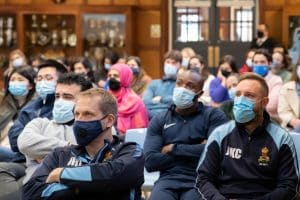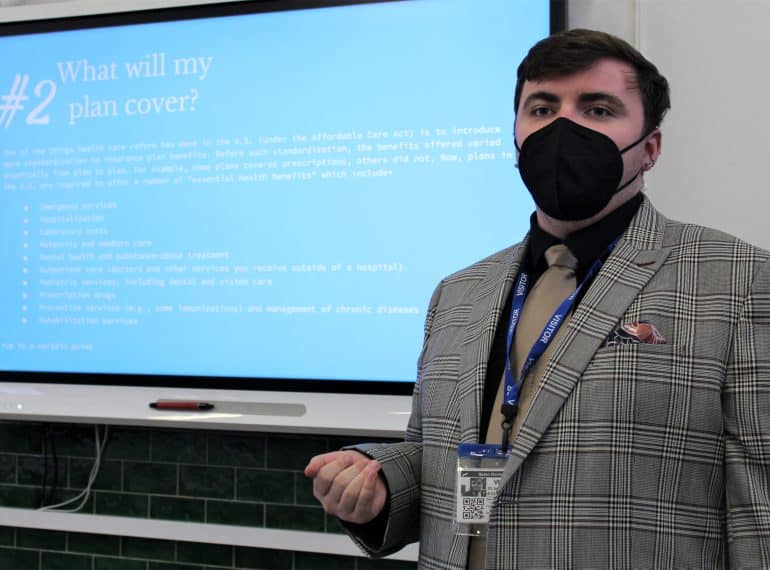
Three interns from the University of Connecticut helped deepen boys’ knowledge of American healthcare at a meeting of QE’s Personal Finance Society.
Pupils heard about the high costs and complexity inherent in the US system, with the session ending in a discussion of the pros and cons of healthcare on both sides of the Atlantic.
The meeting was organised by Ugan Pretheshan, who runs the society along with fellow Year 11 pupil Roshan Patel with the aim of helping boys manage their finances both now and in the future in their adult lives. Other topics covered in its meetings include buying a house and maintaining a good credit score.
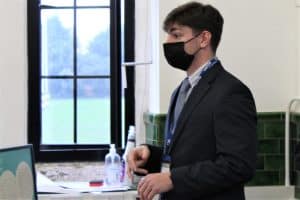 Headmaster Neil Enright said: “I am grateful to our three current interns, Evan Burns, Nathaniel Austin-Mathley, and Ben Duncan, for their contribution to this meeting and to our enrichment programme more generally. Our relationship with the University of Connecticut extends back over a number of years and it is great that we can again welcome interns this year. It is a connection which gives us fascinating insights into the differences in pedagogy and educational culture between our respective countries.
Headmaster Neil Enright said: “I am grateful to our three current interns, Evan Burns, Nathaniel Austin-Mathley, and Ben Duncan, for their contribution to this meeting and to our enrichment programme more generally. Our relationship with the University of Connecticut extends back over a number of years and it is great that we can again welcome interns this year. It is a connection which gives us fascinating insights into the differences in pedagogy and educational culture between our respective countries.
“Their presence allows boys here to more readily make international comparisons and to understand different contexts and policy approaches: the opportunity thus to interrogate a different system is valuable, not least in helping pupils think critically about our own systems.”
“I congratulate Ugan and Roshan on their work with the society: like other pupil-run societies, it is of great benefit both to those who lead it and to those who attend. The Personal Finance Society complements the work of my colleagues who teach topics such as personal finance and other life skills through formal programmes of study, such as QE’s Personal Development Time programme.”
During the meeting, which was overseen by Economics teacher Sheerwan O’Shea-Nejad, the three History interns spoke extensively on American healthcare, telling the boys that it is a complex system that leaves many suffering, both physically and financially.
US healthcare spending grew 9.7 per cent in 2020, they said, reaching $4.1 trillion, or $12,530 per person. As a share of the nation’s Gross Domestic Product, health spending accounted for 19.7 per cent.
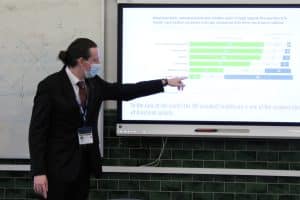 “It was eye-opening to understand the complex and diverse methods of insurance and financing these large hospital bills,” said Ugan. The boys attending learned that insurance companies dominate US healthcare industries, presenting American citizens with a welter of quotation pathways and options – encompassing premiums, walk-in fees and ‘deductibles’ – that can be very difficult to understand. The contrast with the relative simplicity achieved by the NHS system in the UK was highlighted.
“It was eye-opening to understand the complex and diverse methods of insurance and financing these large hospital bills,” said Ugan. The boys attending learned that insurance companies dominate US healthcare industries, presenting American citizens with a welter of quotation pathways and options – encompassing premiums, walk-in fees and ‘deductibles’ – that can be very difficult to understand. The contrast with the relative simplicity achieved by the NHS system in the UK was highlighted.
The meeting also heard a story about what a woman who had got her leg caught between a train and the platform in the US told onlookers: “Don’t call an ambulance. It’s $3,000. I can’t afford that. Call an ‘Uber’.”
Asked what they would do in such a medical emergency in the UK, the boys responded that they would not hesitate to call an ambulance.
The interns, who are supporting the History, Politics and Religious Studies departments this term as part of their Master’s programme, happily answered boys’ questions, before the meeting concluded with a weighing-up of the advantages and disadvantages of both systems, with arguments about price, accessibility and waiting times all factors in the debate.

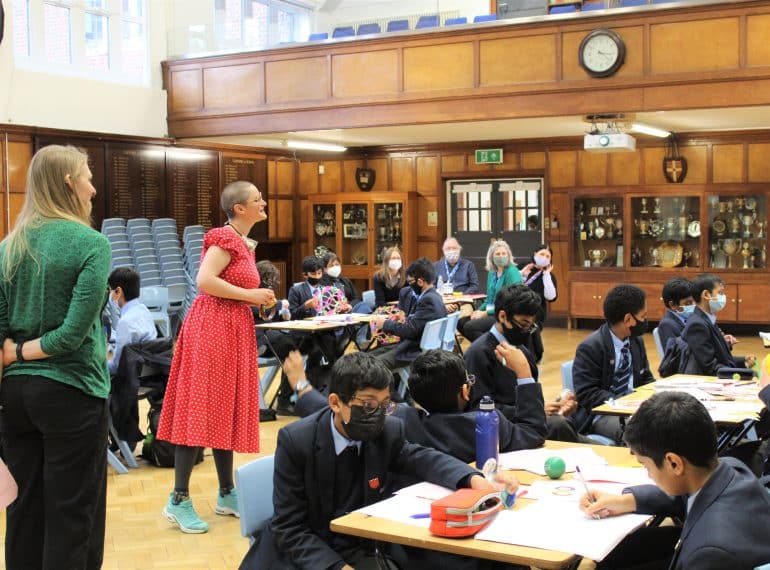
 Assistant Head (Pupil Progress) Sarah Westcott said: “This workshop was an important insight for our students into the lived experience of two members of the neurodiverse community.
Assistant Head (Pupil Progress) Sarah Westcott said: “This workshop was an important insight for our students into the lived experience of two members of the neurodiverse community. Dr Foster and Dr Farahar run
Dr Foster and Dr Farahar run 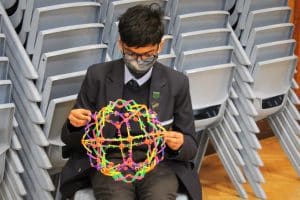 ‘Stimming’ – self-stimulatory behaviour involving repeated actions or activities that either excite or calm the sensory nervous system,
‘Stimming’ – self-stimulatory behaviour involving repeated actions or activities that either excite or calm the sensory nervous system,
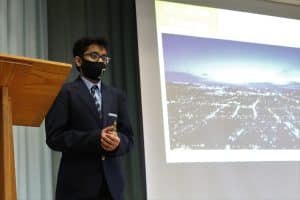 Arhan Panjwani, of Leicester House, took first prize with a talk that urged the grand final audience in the Main School Hall to consider the effect we are having on the world around us and to take action. It was illustrated by his aerial photo of the area near his home, taken by a drone.
Arhan Panjwani, of Leicester House, took first prize with a talk that urged the grand final audience in the Main School Hall to consider the effect we are having on the world around us and to take action. It was illustrated by his aerial photo of the area near his home, taken by a drone.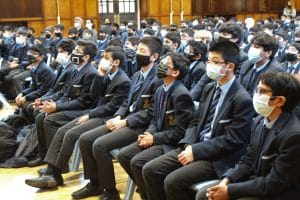 Boys were allowed to speak for up to three minutes about their photograph, but had to talk without notes. Merits were awarded for all six finalists, with 20 House points given for first place, 14 for second and 10 for third.
Boys were allowed to speak for up to three minutes about their photograph, but had to talk without notes. Merits were awarded for all six finalists, with 20 House points given for first place, 14 for second and 10 for third.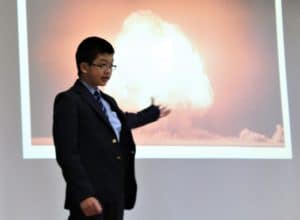 “Notwithstanding such use of ‘human interest’ and the effective deployment of humour by some, many of the boys used their photo to make an important point and deliver a message with wide meaning, giving us plenty to think about.”
“Notwithstanding such use of ‘human interest’ and the effective deployment of humour by some, many of the boys used their photo to make an important point and deliver a message with wide meaning, giving us plenty to think about.”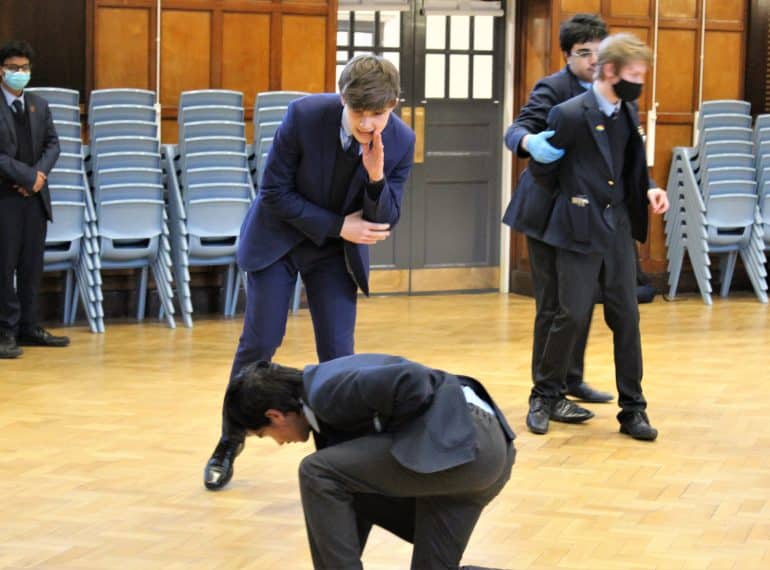
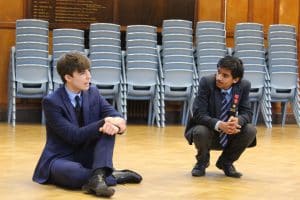 The production will also form part of QE’s homegrown Shakespeare festival, along with a diverse programme of other activities, ranging from an academic lecture to an inter-House competition.
The production will also form part of QE’s homegrown Shakespeare festival, along with a diverse programme of other activities, ranging from an academic lecture to an inter-House competition.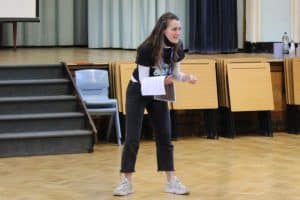 The play tells the story of an African general, Othello, in the 16th-century Venetian army who is tricked into suspecting his wife of adultery. Sexual jealousy and racial prejudice are among its leading motifs. In it, the sinister standard-bearer, Iago, manipulates Othello into a jealous rage, but all the while appears to warn his commander against the destructive emotion: “O beware, my lord, of jealousy; It is the green-eyed monster which doth mock the meat it feeds on” – the first coinage of the term “green-eyed monster”. Other quotations from the play that have become the stuff of everyday speech include: “‘T’is neither here nor there” and “I will wear my heart upon my sleeve”.
The play tells the story of an African general, Othello, in the 16th-century Venetian army who is tricked into suspecting his wife of adultery. Sexual jealousy and racial prejudice are among its leading motifs. In it, the sinister standard-bearer, Iago, manipulates Othello into a jealous rage, but all the while appears to warn his commander against the destructive emotion: “O beware, my lord, of jealousy; It is the green-eyed monster which doth mock the meat it feeds on” – the first coinage of the term “green-eyed monster”. Other quotations from the play that have become the stuff of everyday speech include: “‘T’is neither here nor there” and “I will wear my heart upon my sleeve”.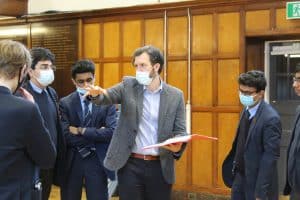 The pupils workshopped a section of the abridged production, with Emma Howell and QE’s resident theatre director, Gavin Malloy, then working with the cast on their positioning, movement and characterisation, in order to help build a dynamic piece.
The pupils workshopped a section of the abridged production, with Emma Howell and QE’s resident theatre director, Gavin Malloy, then working with the cast on their positioning, movement and characterisation, in order to help build a dynamic piece.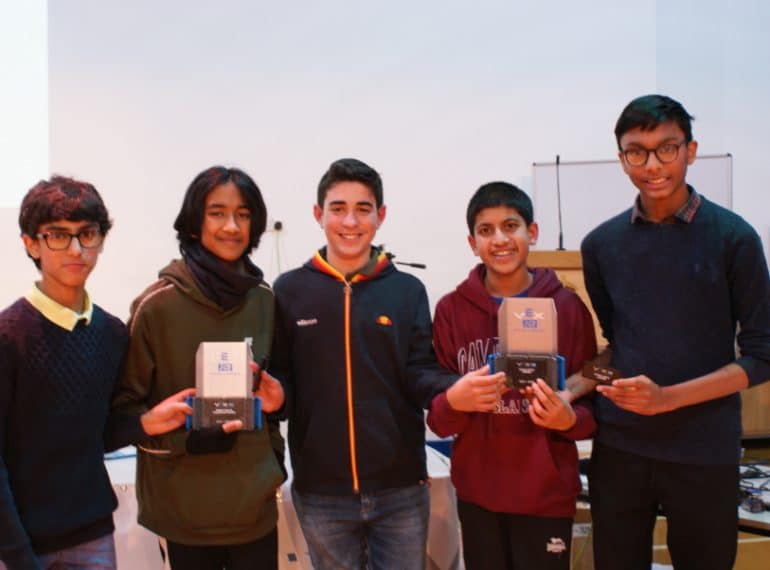
 Thirty-two junior teams, including six from QE, took part in the North London Regional tournament, which QE hosted in the Shearly Hall.
Thirty-two junior teams, including six from QE, took part in the North London Regional tournament, which QE hosted in the Shearly Hall.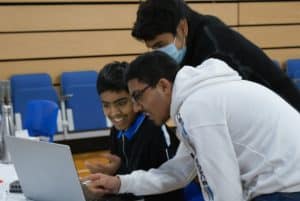 “However, it was a double alliance involving QE teams which pushed things forward in game 12 and 13. Firstly, a tournament high 78 being posted by a combination of QE newcomers Shattersquad and MTS Myopians, followed up by an even more impressive 83 posted by QE’s Year 9 Nova team and NUAST Triceratops. It was clear from this point on that the bar had been raised, with MTS Myopians in particular impressing. QE’s Gearsquad, Nova, and Cyberforce seemed to be battling it out behind them for the highest rankings spots, albeit the latter team were already securely qualified.
“However, it was a double alliance involving QE teams which pushed things forward in game 12 and 13. Firstly, a tournament high 78 being posted by a combination of QE newcomers Shattersquad and MTS Myopians, followed up by an even more impressive 83 posted by QE’s Year 9 Nova team and NUAST Triceratops. It was clear from this point on that the bar had been raised, with MTS Myopians in particular impressing. QE’s Gearsquad, Nova, and Cyberforce seemed to be battling it out behind them for the highest rankings spots, albeit the latter team were already securely qualified.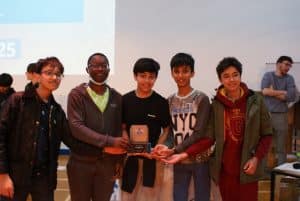 “In the end, it had appeared that Gearsquad had posted an unassailable score: a whopping 110 alongside the HBS Vextreme team. However, as was the case throughout the day, it was the pairing of Nova and MTS who would have the last laugh, and their incredible 125 score secured both teams their Tournament Champion title. The judges gave MTS X_O_Limit the Judges Award, and the Design Award was secured by HBS Spark.
“In the end, it had appeared that Gearsquad had posted an unassailable score: a whopping 110 alongside the HBS Vextreme team. However, as was the case throughout the day, it was the pairing of Nova and MTS who would have the last laugh, and their incredible 125 score secured both teams their Tournament Champion title. The judges gave MTS X_O_Limit the Judges Award, and the Design Award was secured by HBS Spark.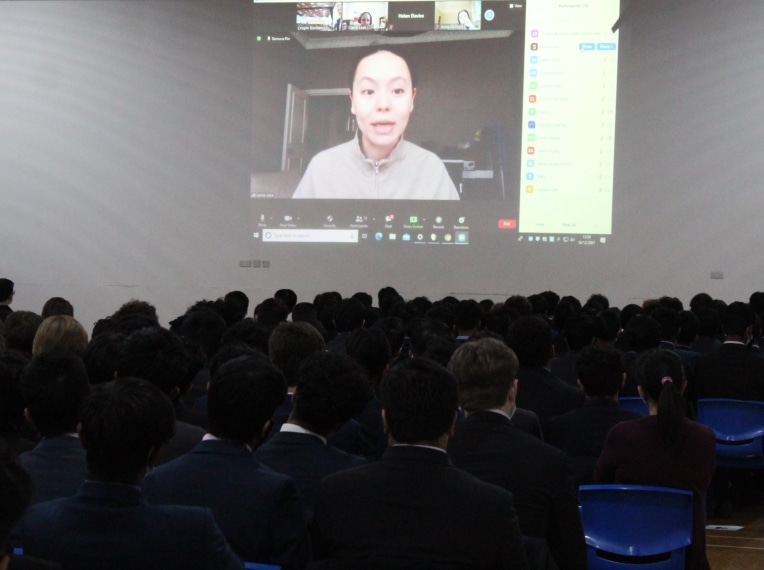
 And in an online lecture given to boys at QE, Soma explained what had inspired her to set it up, namely her shock at realising that almost every girl she knew had suffered from some form of sexual assault whilst growing up.
And in an online lecture given to boys at QE, Soma explained what had inspired her to set it up, namely her shock at realising that almost every girl she knew had suffered from some form of sexual assault whilst growing up.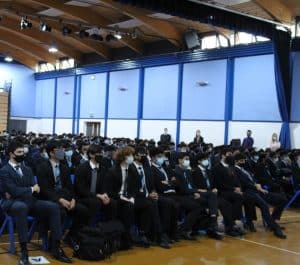 “These are complex times for young people to be growing up in – whether it’s pandemics, culture wars or the challenges of social media, they seem almost bombarded. Yet this lecture felt like a very good way to end the year, with a positive atmosphere in the Shearly Hall as focused, sensitive young people listened intently to someone only a few years older than them,” Mr Bonham-Carter added.
“These are complex times for young people to be growing up in – whether it’s pandemics, culture wars or the challenges of social media, they seem almost bombarded. Yet this lecture felt like a very good way to end the year, with a positive atmosphere in the Shearly Hall as focused, sensitive young people listened intently to someone only a few years older than them,” Mr Bonham-Carter added.